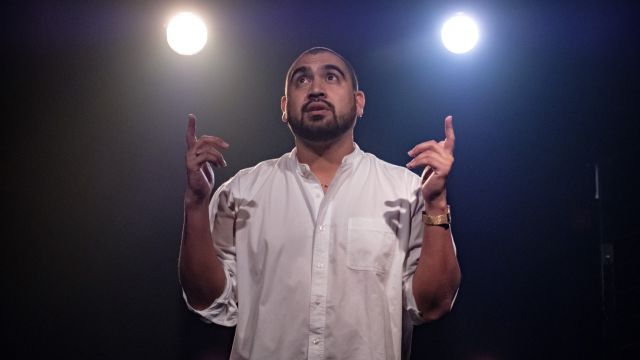Since Ali Died
On an empty stage devoid of set and props Omar Musa cuts a lonely figure as he uses the death of his hero Muhammed Ali as an entrée to an hour of storytelling, poetry and rapping.
Musa interweaves sleek threads to create a rich tapestry of stories about life growing up in a country town. Water flows through the piece in the same way that the river runs through Queanbeyan, where Musa grew up.
In spite of the spartan setting, Musa’s magnetic persona draws us in to his stories and it becomes an intimate experience, much like a visit from an old friend. He is a personable, eloquent, sometimes tragic, sometimes comedic performer.
Musa’s writing is extraordinary, which is no surprise given that his first novel was long listed for the Miles Franklin Award.The words flow thick and fast, they are chosen carefully; earnest, acerbic, witty, astute words, each dripping with meaning.
 Director Anthea Williams, a champion of new Australian writing, has been with the piece since it was first performed as part of Griffin Theatre Company’s Batch Festival in 2018 and gives us an intense and thought-provoking hour with Musa.
Director Anthea Williams, a champion of new Australian writing, has been with the piece since it was first performed as part of Griffin Theatre Company’s Batch Festival in 2018 and gives us an intense and thought-provoking hour with Musa.
The lighting design neatly partitions the stage and effortlessly assists the narrative of the piece.
Musa’s stories address many coming of age issues and are not always comfortable to hear, but he expertly navigates us from rough waters to smooth. He tells tales of boys becoming men, of Australian masculinity. Tales of childhood friends growing up and becoming increasingly troubled. Tales of deep and infatuating love of an ethereal woman that is ultimately unrequited.
He tells the story of being told while at primary school that his skin is the colour of shit. It was this event that led to his parents telling him about Muhammed Ali, giving him a role model, a hero, a man proud of his race, proud of his colour and proud of his religion. At this point we understand wholeheartedly why Musa spent hours crying in a Redfern pub when Ali died.
One gets the sense that performing Since Ali Died is difficult for Musa, the revisiting of painful personal stories taxing. He indicated that the two performances for the OzAsia Festival may be its last outing, however it’s not the first time he’s said that.
If Musa does bring it back, make sure you’re there to see his ‘verbal scallywaggery’. It’s a moving, provocative study of the realities of life for a brown skinned man living on black land run by whites. The “land of the fair skinned, fairy bread, fair go”.
Jenny Fewster
Photographer: Robert Catto
Subscribe to our E-Newsletter, buy our latest print edition or find a Performing Arts book at Book Nook.

